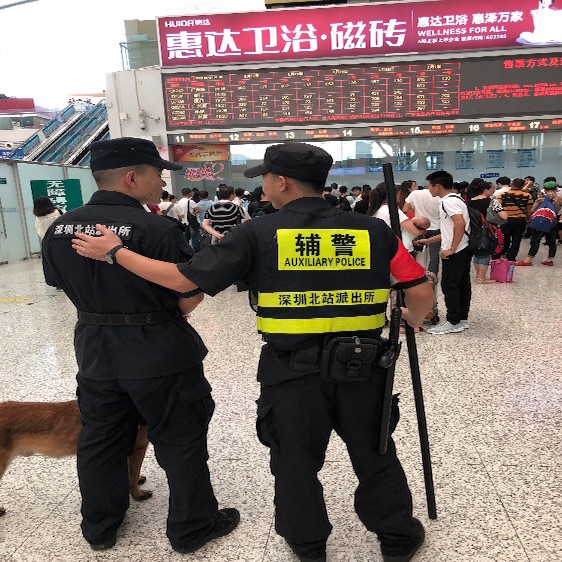Proliferating police
« previous post | next post »
From an anonymous contributor (photo taken at noon yesterday):
I'm posting this for two reasons:
1. to keep abreast of the burgeoning bilingual / biscriptal vocabulary for police in China
2. to complement our gallery of photographs documenting #1
The top label on the back of the man to the right says:
fǔjǐng 辅警
("auxiliary police")
The bottom label reads:
Shēnzhèn běi zhàn pàichūsuǒ 深圳北站派出所
("Shenzhen North Station Police Dispatch Station")
Knowledgeable readers may wish to comment on his long stave and other equipment he and his partner have.
Readings
- "Special diligence: police and security forces in China" (4/14/18) — with multiple photographs and long lists of names for different types of police
- "'Suffered We Protect They'" (12/22/14)
- "Pinyin in practice" (10/13/11)

Jeremy Daum said,
June 28, 2018 @ 7:13 pm
Proposed revisions to the Policing law will actually include 辅警. I don't think there is really a surge in different police nomenclature, but uniforms and terminology needs to be cleared up, as well as rules on use of private security contractors to perform security for government services.
The sticks (and a large blunt fork tool ) are standard and non-restricted equipment at every school, subway station, and many other public venues, usually with a plastic riot shield nearby. Horrible optics, but can be effective at keeping an attacker at a safe distance as firearms are a rarity.
Victor Mair said,
June 28, 2018 @ 8:10 pm
"I don't think there is really a surge in different police nomenclature…."
Please read:
"Special diligence: police and security forces in China" (4/14/18)
http://languagelog.ldc.upenn.edu/nll/?p=37700
Cited in the o.p.
Victor Mair said,
June 29, 2018 @ 12:15 am
It is ironic that black-clad security guards were mentioned in a harshly negative light with regard to a tragic event that took place in Shanghai today. See:
"Shanghai Knife Attack Kills Two Schoolchildren"
New York Times-June 28, 2018
https://www.nytimes.com/2018/06/28/world/asia/shanghai-school-knife-attack-.html
The last two paragraphs read thus:
=====
One photo from Shanghai on Thursday showed a security guard standing several feet behind civilians who were apparently trying to seize the suspect. That image stirred anger online among people who thought the security guards could have acted more quickly.
“These are the black-clothed security guards swarming all over the streets that you all pay so much to hire,” wrote one Shanghai resident on Weibo, the social media service. “Most of the time I don’t know if they’re any use, but look where they’re standing during today’s incident!”
=====
See also:
"Knife-wielding man kills 2 primary school children in Shanghai", Channel NewsAsia (6/28/18)
https://www.channelnewsasia.com/news/asia/knife-wielding-man-kills-2-primary-school-children-in-shanghai-10478982
"Knife-wielding man kills two primary schoolchildren in Shanghai", Reuters (6/28/18)
https://www.reuters.com/article/us-china-crime-children/knife-wielding-man-kills-two-primary-schoolchildren-in-shanghai-idUSKBN1JO0LG
VHM: The same old pattern. Time and time again. Disgruntled, disaffected young men murdering school children, often at the entrance to an elementary school.
See the discussion of guānggùn 光棍 ("bare branch") here:
"The transcription of the name 'China' in Chinese characters" (6/17/12)
http://languagelog.ldc.upenn.edu/nll/?p=4026
Almost invariably, Western media — if they report such horrific events at all — will solemnly intone that violence is rare in China and will mention tight gun control. But this is nonsense. Violence is quite common in China; it's just that it doesn't get reported because of tight media control.
Reports on these school knifings also almost never mention that they are usually carried out by unmarried men in their 20s and 30s. As I have pointed out repeatedly, this is a serious social problem that goes back to imperial times and is brought about by: 1. gender imbalance (not enough women to go around), 2. social inequity (poor men are considered inappropriate for marriage, whereas well-off men may have multiple wives, concubines, or [nowadays] mistresses).
As for the security guards who stood around doing nothing to stop the violence mentioned in the last two paragraphs of the NYT article quoted above, it is doubly ironic that earlier today I had written this very post about them.
See also:
"Special diligence: police and security forces in China" (4/14/18) — with multiple photographs and long lists of names for different types of police
http://languagelog.ldc.upenn.edu/nll/?p=37700
Victor Mair said,
June 30, 2018 @ 5:13 am
I have found out from friends in China that it is forbidden to talk about the event described in the previous comment, and references to it have been scrubbed from the internet there.
This is the "CCP sanitized world" in which Chinese live. Orwellian already, and increasingly so under Chairman Xi.
My friends in China euphemistically refer to the event described below as "the Shanghai tragedy", "the Shanghai incident", etc. Similar euphemisms are used to refer to the Tiananman Massacre of June 4, 1989, when it is mentioned at all (most Chinese I meet don't know anything about it, so effectively obliterated from Chinese history books is it, despite the fact that hundreds, and more likely thousands, of citizens were killed by government troops at that time, and not just in Beijing, but also Shanghai, Chengdu, and elsewhere).
Rodger C said,
July 1, 2018 @ 10:43 am
most Chinese I meet don't know anything about it, so effectively obliterated from Chinese history books is it
Not a practice restricted to China or Leninist countries. When I first read García Márquez’s Cien años de soledad, I took special note of the UFC massacre and the fact that a generation later, young people didn't believe it'd happened because it wasn't in their history books. As a twentysomething from WV just learning about the mine wars of the Twenties, I was struck by the parallel.